Marshall Hodgson. Rethinking World History: Essays on Europe, Islam and World History
Подождите немного. Документ загружается.

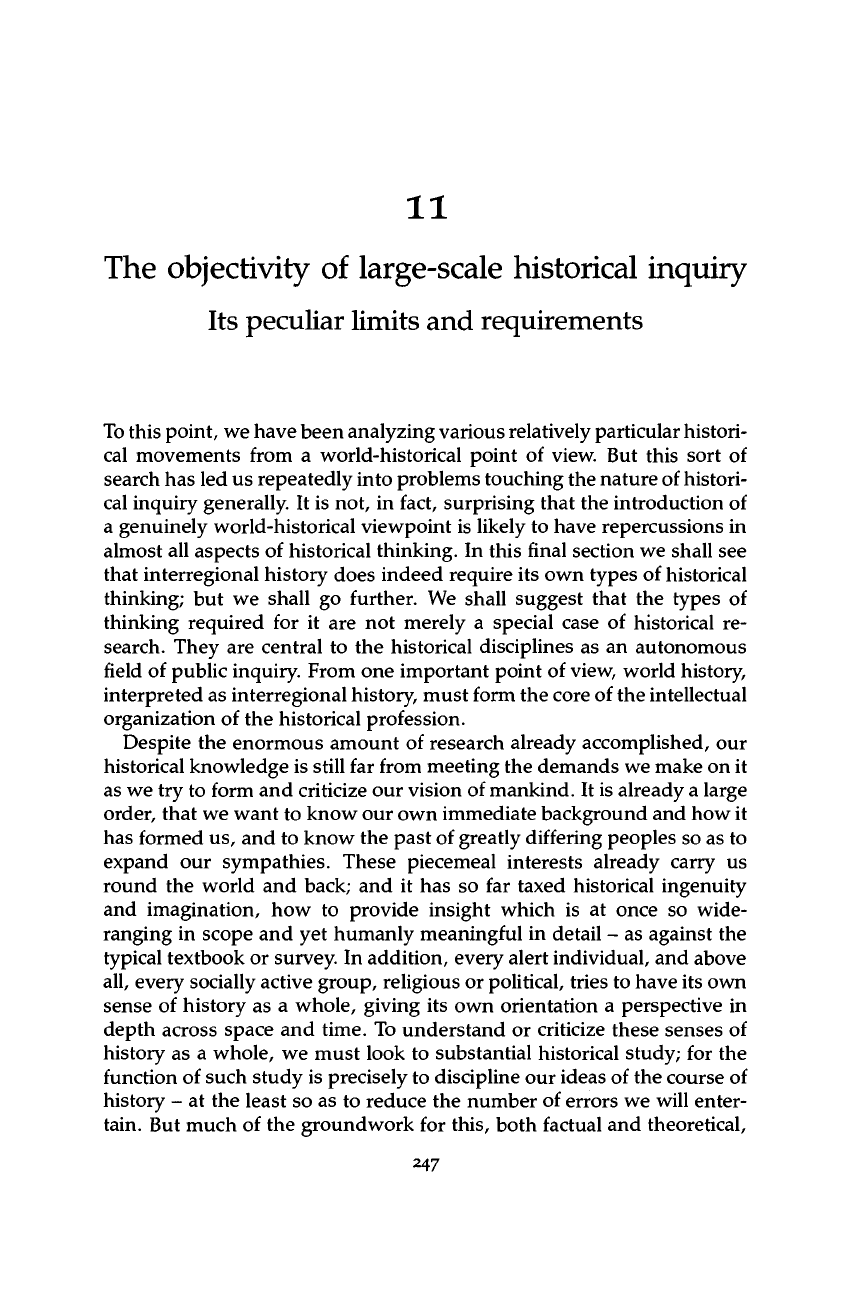
11
The objectivity of large-scale historical inquiry
Its peculiar limits and requirements
To
this point, we have been analyzing various relatively particular histori-
cal movements from a world-historical point of view. But this sort of
search has led us repeatedly into problems touching the nature of histori-
cal inquiry generally. It is not, in fact, surprising that the introduction of
a genuinely world-historical viewpoint is likely to have repercussions in
almost all aspects of historical thinking. In this final section we shall see
that interregional history does indeed require its own types of historical
thinking; but we shall go further. We shall suggest that the types of
thinking required for it are not merely a special case of historical re-
search. They are central to the historical disciplines as an autonomous
field of public inquiry. From one important point of view, world history,
interpreted as interregional history, must form the core of the intellectual
organization of the historical profession.
Despite the enormous amount of research already accomplished, our
historical knowledge is still far from meeting the demands we make on it
as we try to form and criticize our vision of mankind. It is already a large
order, that we want to know our own immediate background and how it
has formed us, and to know the past of greatly differing peoples so as to
expand our sympathies. These piecemeal interests already carry us
round the world and back; and it has so far taxed historical ingenuity
and imagination, how to provide insight which is at once so wide-
ranging in scope and yet humanly meaningful in detail - as against the
typical textbook or survey. In addition, every alert individual, and above
all,
every socially active group, religious or political, tries to have its own
sense of history as a whole, giving its own orientation a perspective in
depth across space and time. To understand or criticize these senses of
history as a whole, we must look to substantial historical study; for the
function of such study is precisely to discipline our ideas of the course of
history - at the least so as to reduce the number of errors we will enter-
tain. But much of the groundwork for this, both factual and theoretical,
247
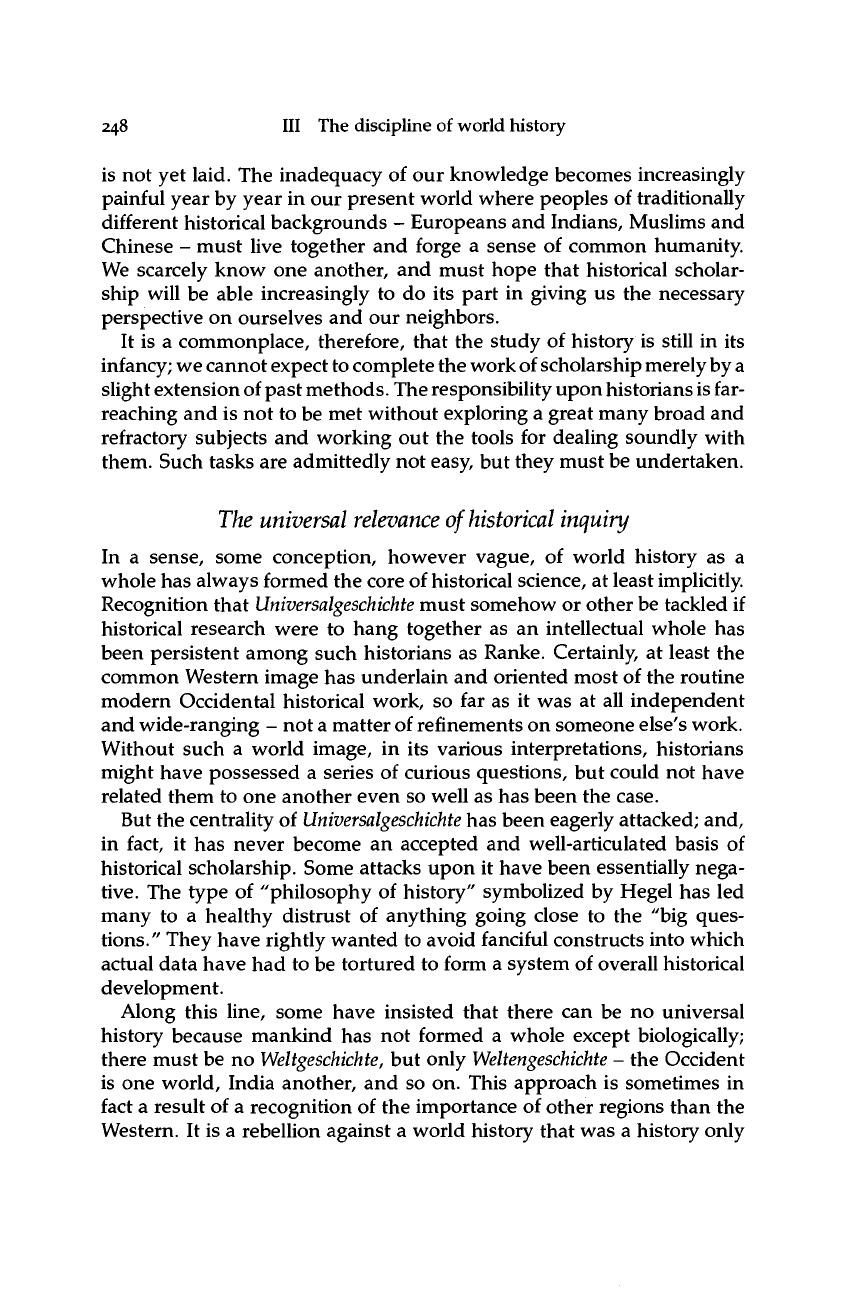
248 III The discipline of world history
is not yet laid. The inadequacy of our knowledge becomes increasingly
painful year by year in our present world where peoples of traditionally
different historical backgrounds - Europeans and Indians, Muslims and
Chinese - must live together and forge a sense of common humanity.
We scarcely know one another, and must hope that historical scholar-
ship will be able increasingly to do its part in giving us the necessary
perspective on ourselves and our neighbors.
It is a commonplace, therefore, that the study of history is still in its
infancy; we cannot expect to complete the work of scholarship merely by
a
slight extension of past
methods.
The responsibility upon historians
is
far-
reaching and is not to be met without exploring a great many broad and
refractory subjects and working out the tools for dealing soundly with
them. Such tasks are admittedly not easy, but they must be undertaken.
The universal
relevance
of
historical
inquiry
In a sense, some conception, however vague, of world history as a
whole has always formed the core of historical science, at least implicitly.
Recognition that
Universalgeschichte
must somehow or other be tackled if
historical research were to hang together as an intellectual whole has
been persistent among such historians as Ranke. Certainly, at least the
common Western image has underlain and oriented most of the routine
modern Occidental historical work, so far as it was at all independent
and wide-ranging - not a matter of refinements on someone else's work.
Without such a world image, in its various interpretations, historians
might have possessed a series of curious questions, but could not have
related them to one another even so well as has been the case.
But the centrality of
Universalgeschichte
has been eagerly attacked; and,
in fact, it has never become an accepted and well-articulated basis of
historical scholarship. Some attacks upon it have been essentially nega-
tive.
The type of "philosophy of history" symbolized by Hegel has led
many to a healthy distrust of anything going close to the "big ques-
tions."
They have rightly wanted to avoid fanciful constructs into which
actual data have had to be tortured to form a system of overall historical
development.
Along this line, some have insisted that there can be no universal
history because mankind has not formed a whole except biologically;
there must be no
Weltgeschichte,
but only
Weltengeschichte
- the Occident
is one world, India another, and so on. This approach is sometimes in
fact a result of a recognition of the importance of other regions than the
Western. It is a rebellion against a world history that was a history only
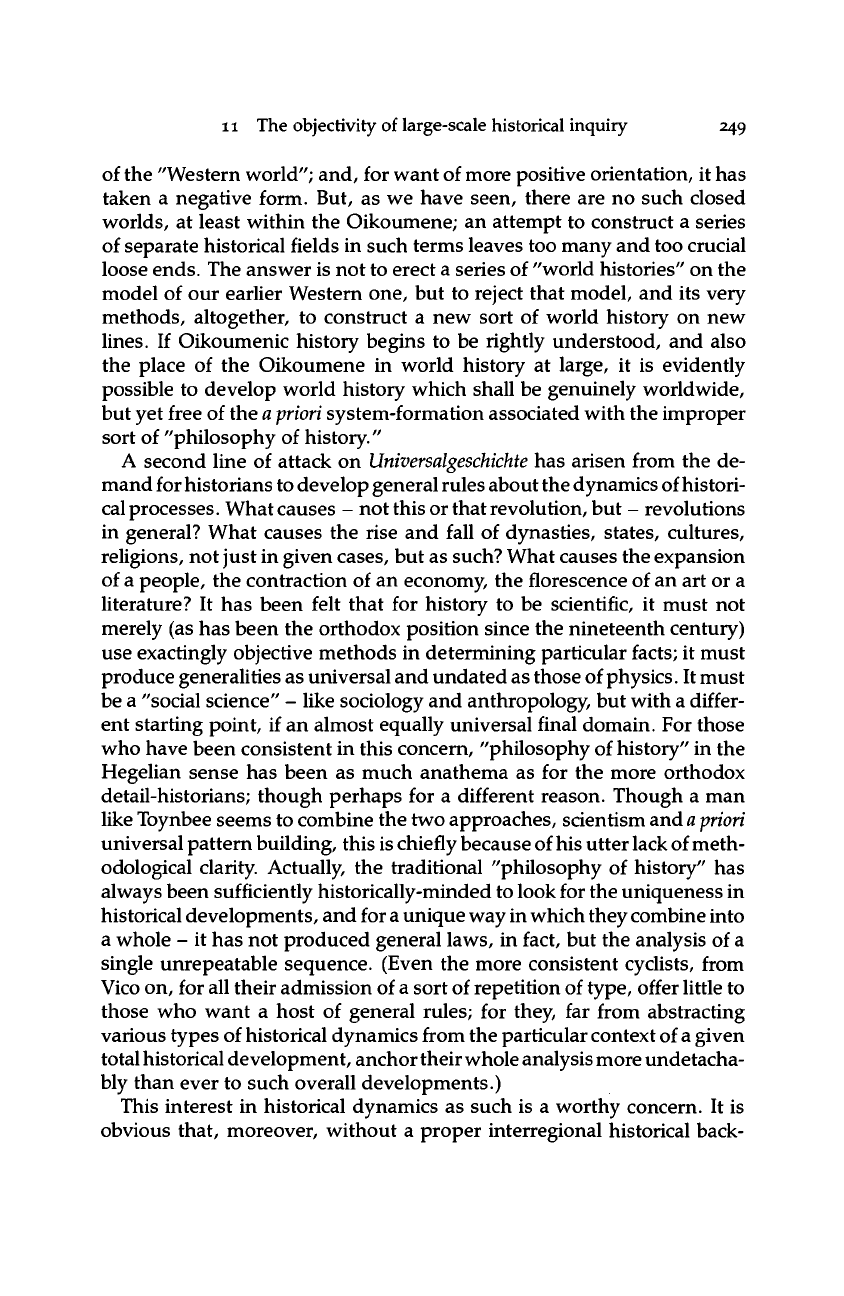
ii The objectivity of large-scale historical inquiry 249
of the "Western world"; and, for want of more positive orientation, it has
taken a negative form. But, as we have seen, there are no such closed
worlds, at least within the Oikoumene; an attempt to construct a series
of separate historical fields in such terms leaves too many and too crucial
loose ends. The answer is not to erect a series of "world histories" on the
model of our earlier Western one, but to reject that model, and its very
methods, altogether, to construct a new sort of world history on new
lines.
If Oikoumenic history begins to be rightly understood, and also
the place of the Oikoumene in world history at large, it is evidently
possible to develop world history which shall be genuinely worldwide,
but yet free of the
a priori
system-formation associated with the improper
sort of "philosophy of history."
A second line of attack on
Universalgeschichte
has arisen from the de-
mand for historians to develop general rules about the dynamics of histori-
cal
processes.
What causes - not this or that revolution, but - revolutions
in general? What causes the rise and fall of dynasties, states, cultures,
religions, not just in given cases, but as such? What causes the expansion
of a people, the contraction of an economy, the florescence of an art or a
literature? It has been felt that for history to be scientific, it must not
merely (as has been the orthodox position since the nineteenth century)
use exactingly objective methods in determining particular facts; it must
produce generalities as universal and undated as those of
physics.
It must
be a "social science" - like sociology and anthropology, but with a differ-
ent starting point, if an almost equally universal final domain. For those
who have been consistent in this concern, "philosophy of history" in the
Hegelian sense has been as much anathema as for the more orthodox
detail-historians; though perhaps for a different reason. Though a man
like Toynbee seems to combine the two approaches, scientism and
a priori
universal pattern building, this is chiefly because of
his
utter lack of meth-
odological clarity. Actually, the traditional "philosophy of history" has
always been sufficiently historically-minded to look for the uniqueness in
historical developments, and for
a
unique way in which they combine into
a whole - it has not produced general laws, in fact, but the analysis of a
single unrepeatable sequence. (Even the more consistent cyclists, from
Vico on, for all their admission of a sort of repetition of type, offer little to
those who want a host of general rules; for they, far from abstracting
various types of historical dynamics from the particular context of
a
given
total historical development, anchor their whole analysis more undetacha-
bly than ever to such overall developments.)
This interest in historical dynamics as such is a worthy concern. It is
obvious that, moreover, without a proper interregional historical back-
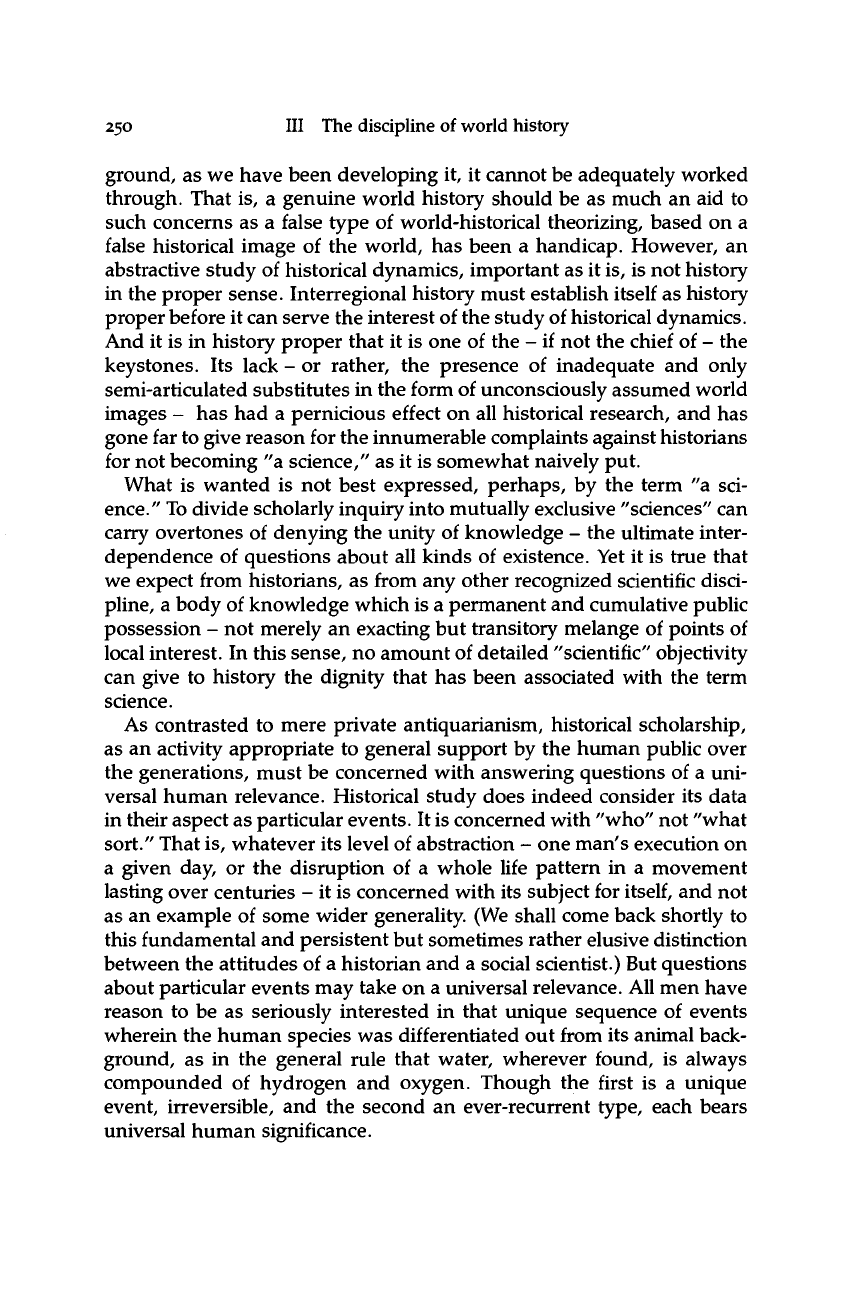
250 III The discipline of world history
ground, as we have been developing it, it cannot be adequately worked
through. That is, a genuine world history should be as much an aid to
such concerns as a false type of world-historical theorizing, based on a
false historical image of the world, has been a handicap. However, an
abstractive study of historical dynamics, important as it is, is not history
in the proper sense. Interregional history must establish itself as history
proper before it can serve the interest of the study of historical dynamics.
And it is in history proper that it is one of the - if not the chief of - the
keystones. Its lack - or rather, the presence of inadequate and only
semi-articulated substitutes in the form of unconsciously assumed world
images - has had a pernicious effect on all historical research, and has
gone far to give reason for the innumerable complaints against historians
for not becoming "a science," as it is somewhat naively put.
What is wanted is not best expressed, perhaps, by the term "a sci-
ence/'
To divide scholarly inquiry into mutually exclusive "sciences" can
carry overtones of denying the unity of knowledge - the ultimate inter-
dependence of questions about all kinds of existence. Yet it is true that
we expect from historians, as from any other recognized scientific disci-
pline, a body of knowledge which is a permanent and cumulative public
possession - not merely an exacting but transitory melange of points of
local interest. In this sense, no amount of detailed "scientific" objectivity
can give to history the dignity that has been associated with the term
science.
As contrasted to mere private antiquarianism, historical scholarship,
as an activity appropriate to general support by the human public over
the generations, must be concerned with answering questions of a uni-
versal human relevance. Historical study does indeed consider its data
in their aspect as particular events. It is concerned with "who" not "what
sort." That
is,
whatever its level of abstraction - one man's execution on
a given day, or the disruption of a whole life pattern in a movement
lasting over centuries - it is concerned with its subject for
itself,
and not
as an example of some wider generality. (We shall come back shortly to
this fundamental and persistent but sometimes rather elusive distinction
between the attitudes of a historian and a social scientist.) But questions
about particular events may take on a universal relevance. All men have
reason to be as seriously interested in that unique sequence of events
wherein the human species was differentiated out from its animal back-
ground, as in the general rule that water, wherever found, is always
compounded of hydrogen and oxygen. Though the first is a unique
event, irreversible, and the second an ever-recurrent type, each bears
universal human significance.
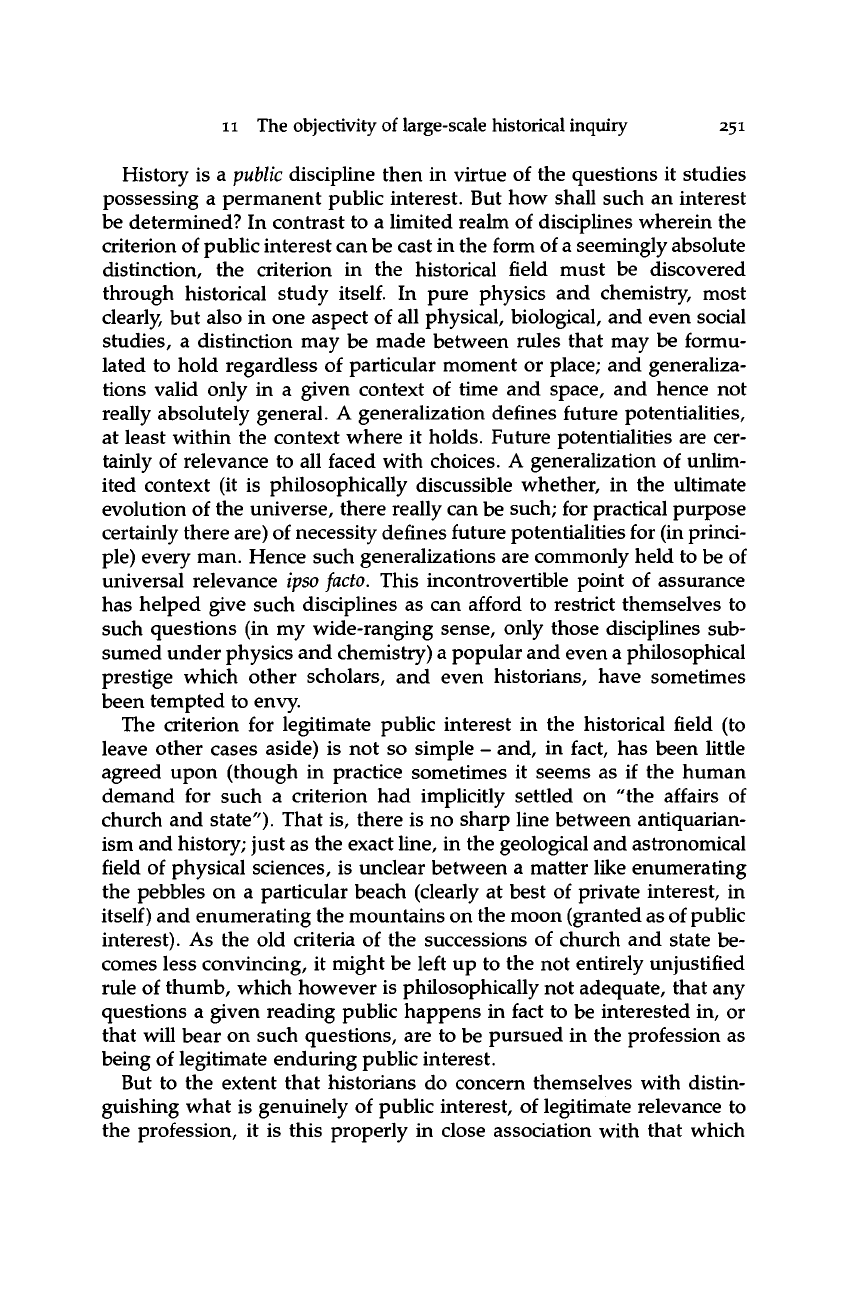
ii The objectivity of large-scale historical inquiry 251
History is a
public
discipline then in virtue of the questions it studies
possessing a permanent public interest. But how shall such an interest
be determined? In contrast to a limited realm of disciplines wherein the
criterion of public interest can be cast in the form of
a
seemingly absolute
distinction, the criterion in the historical field must be discovered
through historical study
itself.
In pure physics and chemistry, most
clearly, but also in one aspect of all physical, biological, and even social
studies, a distinction may be made between rules that may be formu-
lated to hold regardless of particular moment or place; and generaliza-
tions valid only in a given context of time and space, and hence not
really absolutely general. A generalization defines future potentialities,
at least within the context where it holds. Future potentialities are cer-
tainly of relevance to all faced with choices. A generalization of unlim-
ited context (it is philosophically discussible whether, in the ultimate
evolution of the universe, there really can be such; for practical purpose
certainly there are) of necessity defines future potentialities for (in princi-
ple) every man. Hence such generalizations are commonly held to be of
universal relevance
ipso
facto.
This incontrovertible point of assurance
has helped give such disciplines as can afford to restrict themselves to
such questions (in my wide-ranging sense, only those disciplines sub-
sumed under physics and chemistry) a popular and even a philosophical
prestige which other scholars, and even historians, have sometimes
been tempted to envy.
The criterion for legitimate public interest in the historical field (to
leave other cases aside) is not so simple - and, in fact, has been little
agreed upon (though in practice sometimes it seems as if the human
demand for such a criterion had implicitly settled on "the affairs of
church and state"). That is, there is no sharp line between antiquarian-
ism and history; just as the exact line, in the geological and astronomical
field of physical sciences, is unclear between a matter like enumerating
the pebbles on a particular beach (clearly at best of private interest, in
itself) and enumerating the mountains on the moon (granted as of public
interest). As the old criteria of the successions of church and state be-
comes less convincing, it might be left up to the not entirely unjustified
rule of thumb, which however is philosophically not adequate, that any
questions a given reading public happens in fact to be interested in, or
that will bear on such questions, are to be pursued in the profession as
being of legitimate enduring public interest.
But to the extent that historians do concern themselves with distin-
guishing what is genuinely of public interest, of legitimate relevance to
the profession, it is this properly in close association with that which
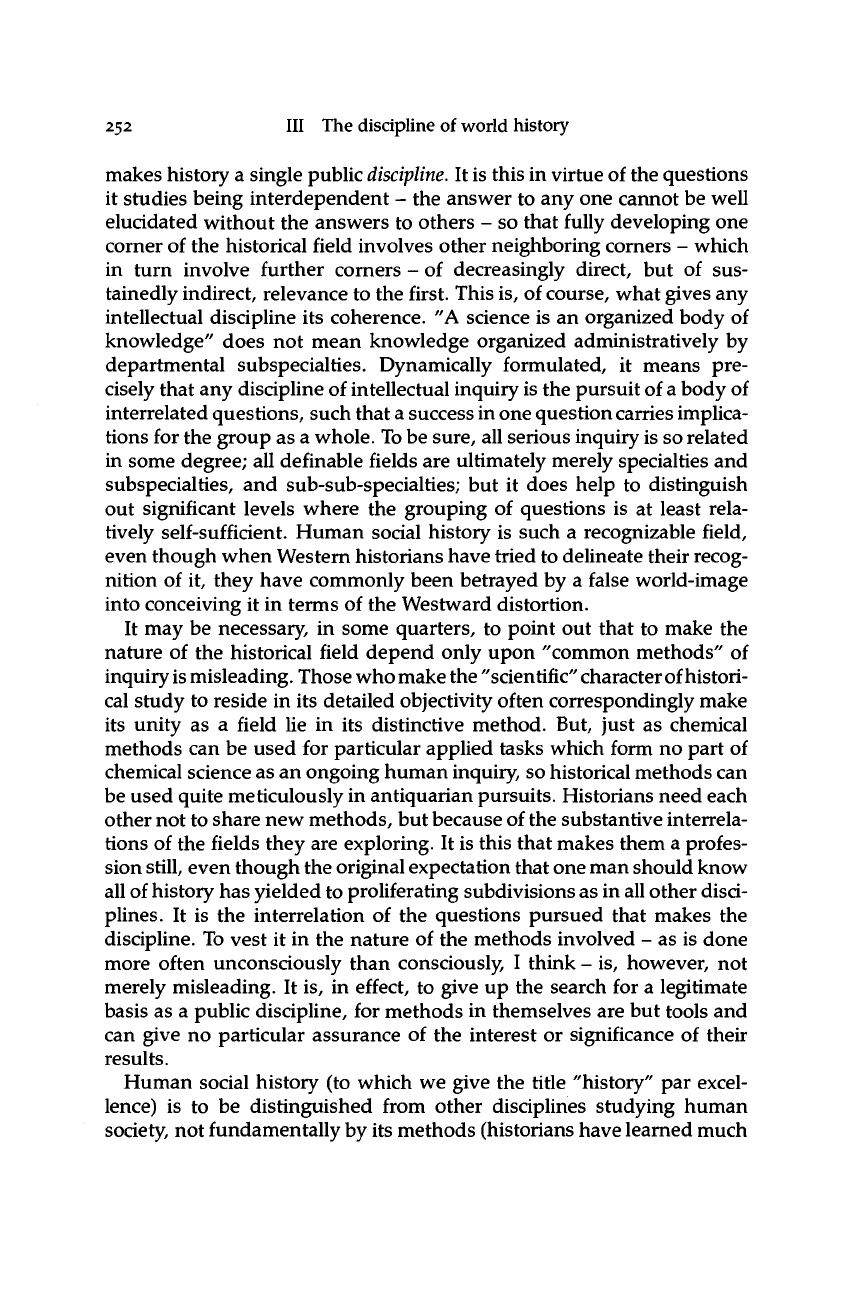
252 III The discipline of world history
makes history a single public
discipline.
It is this
in
virtue
of
the questions
it studies being interdependent
- the
answer
to any one
cannot
be
well
elucidated without
the
answers
to
others
- so
that fully developing
one
corner
of
the historical field involves other neighboring corners
-
which
in turn involve further corners
- of
decreasingly direct,
but of sus-
tainedly indirect, relevance
to
the first. This is,
of
course, what gives any
intellectual discipline
its
coherence.
"A
science
is an
organized body
of
knowledge" does
not
mean knowledge organized administratively
by
departmental subspecialties. Dynamically formulated,
it
means
pre-
cisely that any discipline
of
intellectual inquiry is the pursuit
of
a body of
interrelated questions, such that a success in one question carries implica-
tions
for
the group
as a
whole.
To
be sure, all serious inquiry is so related
in some degree;
all
definable fields
are
ultimately merely specialties
and
subspecialties,
and
sub-sub-specialties;
but it
does help
to
distinguish
out significant levels where
the
grouping
of
questions
is at
least rela-
tively self-sufficient. Human social history
is
such
a
recognizable field,
even though when Western historians have tried to delineate their recog-
nition
of it,
they have commonly been betrayed
by a
false world-image
into conceiving
it in
terms
of
the Westward distortion.
It
may be
necessary,
in
some quarters,
to
point
out
that
to
make
the
nature
of the
historical field depend only upon "common methods"
of
inquiry
is
misleading. Those who make the "scientific" character of histori-
cal study
to
reside
in its
detailed objectivity often correspondingly make
its unity
as a
field
lie in its
distinctive method.
But,
just
as
chemical
methods
can be
used
for
particular applied tasks which form
no
part of
chemical science as
an
ongoing human inquiry, so historical methods can
be used quite meticulously
in
antiquarian pursuits. Historians need each
other not to share new methods, but because
of
the substantive interrela-
tions
of
the fields they
are
exploring.
It
is this that makes them
a
profes-
sion still, even though the original expectation that one man should know
all
of
history has yielded to proliferating subdivisions as
in
all other disci-
plines.
It is the
interrelation
of the
questions pursued that makes
the
discipline. To vest
it in the
nature
of the
methods involved
- as is
done
more often unconsciously than consciously,
I
think
-
is, however,
not
merely misleading.
It
is,
in
effect,
to
give
up the
search
for a
legitimate
basis
as a
public discipline,
for
methods
in
themselves
are but
tools
and
can give
no
particular assurance
of the
interest
or
significance
of
their
results.
Human social history
(to
which
we
give
the
title "history"
par
excel-
lence)
is to be
distinguished from other disciplines studying human
society, not fundamentally by its methods (historians have learned much
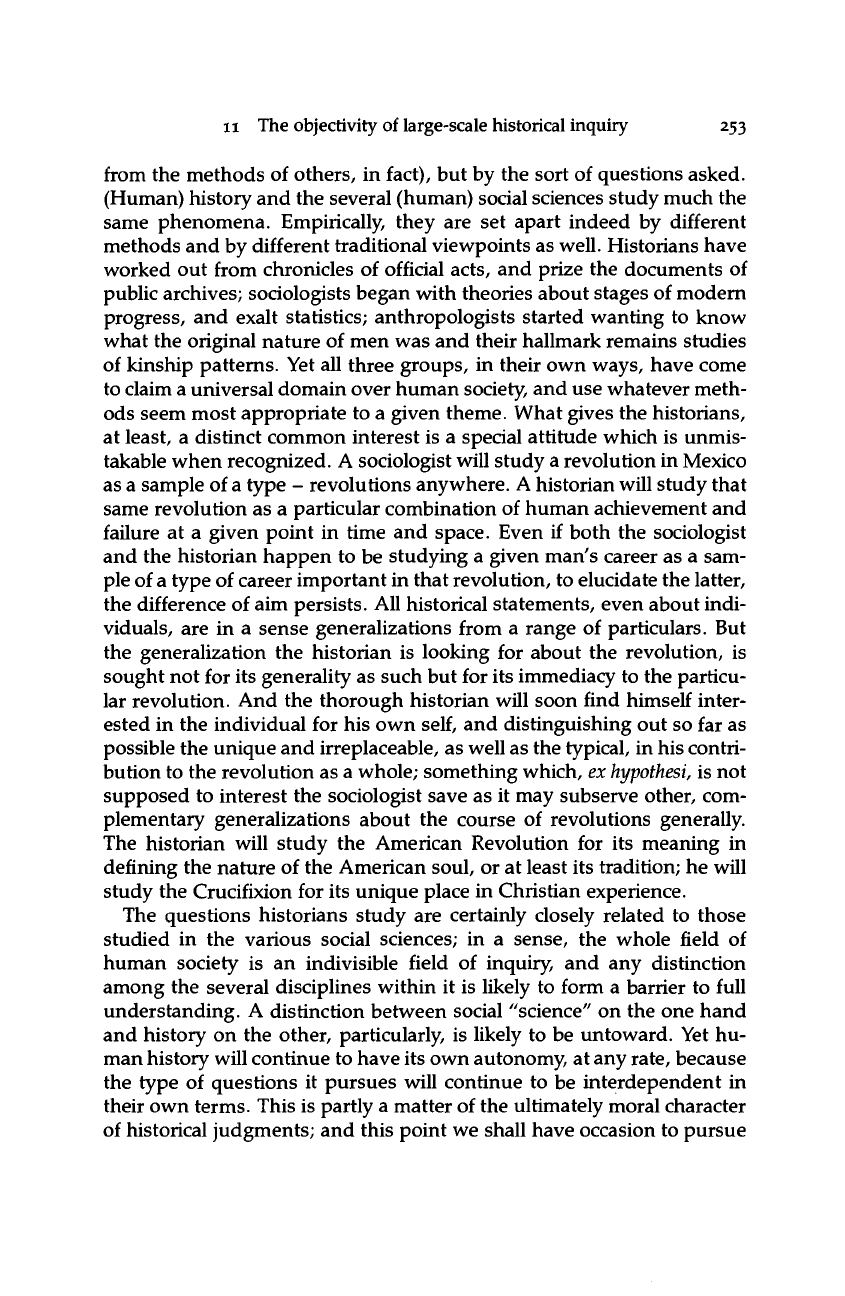
ii The objectivity of large-scale historical inquiry 253
from the methods of others, in fact), but by the sort of questions asked.
(Human) history and the several (human) social sciences study much the
same phenomena. Empirically, they are set apart indeed by different
methods and by different traditional viewpoints as well. Historians have
worked out from chronicles of official acts, and prize the documents of
public archives; sociologists began with theories about stages of modern
progress, and exalt statistics; anthropologists started wanting to know
what the original nature of men was and their hallmark remains studies
of kinship patterns. Yet all three groups, in their own ways, have come
to claim a universal domain over human society, and use whatever meth-
ods seem most appropriate to a given theme. What gives the historians,
at least, a distinct common interest is a special attitude which is unmis-
takable when recognized. A sociologist will study a revolution in Mexico
as a sample of a type - revolutions anywhere. A historian will study that
same revolution as a particular combination of human achievement and
failure at a given point in time and space. Even if both the sociologist
and the historian happen to be studying a given man's career as a sam-
ple of a type of career important in that revolution, to elucidate the latter,
the difference of aim persists. All historical statements, even about indi-
viduals, are in a sense generalizations from a range of particulars. But
the generalization the historian is looking for about the revolution, is
sought not for its generality as such but for its immediacy to the particu-
lar revolution. And the thorough historian will soon find himself inter-
ested in the individual for his own
self,
and distinguishing out so far as
possible the unique and irreplaceable, as well as the typical, in his contri-
bution to the revolution as a whole; something which,
ex
hypothesi,
is not
supposed to interest the sociologist save as it may subserve other, com-
plementary generalizations about the course of revolutions generally.
The historian will study the American Revolution for its meaning in
defining the nature of the American soul, or at least its tradition; he will
study the Crucifixion for its unique place in Christian experience.
The questions historians study are certainly closely related to those
studied in the various social sciences; in a sense, the whole field of
human society is an indivisible field of inquiry, and any distinction
among the several disciplines within it is likely to form a barrier to full
understanding. A distinction between social "science" on the one hand
and history on the other, particularly, is likely to be untoward. Yet hu-
man history will continue to have its own autonomy, at any rate, because
the type of questions it pursues will continue to be interdependent in
their own terms. This is partly a matter of the ultimately moral character
of historical judgments; and this point we shall have occasion to pursue
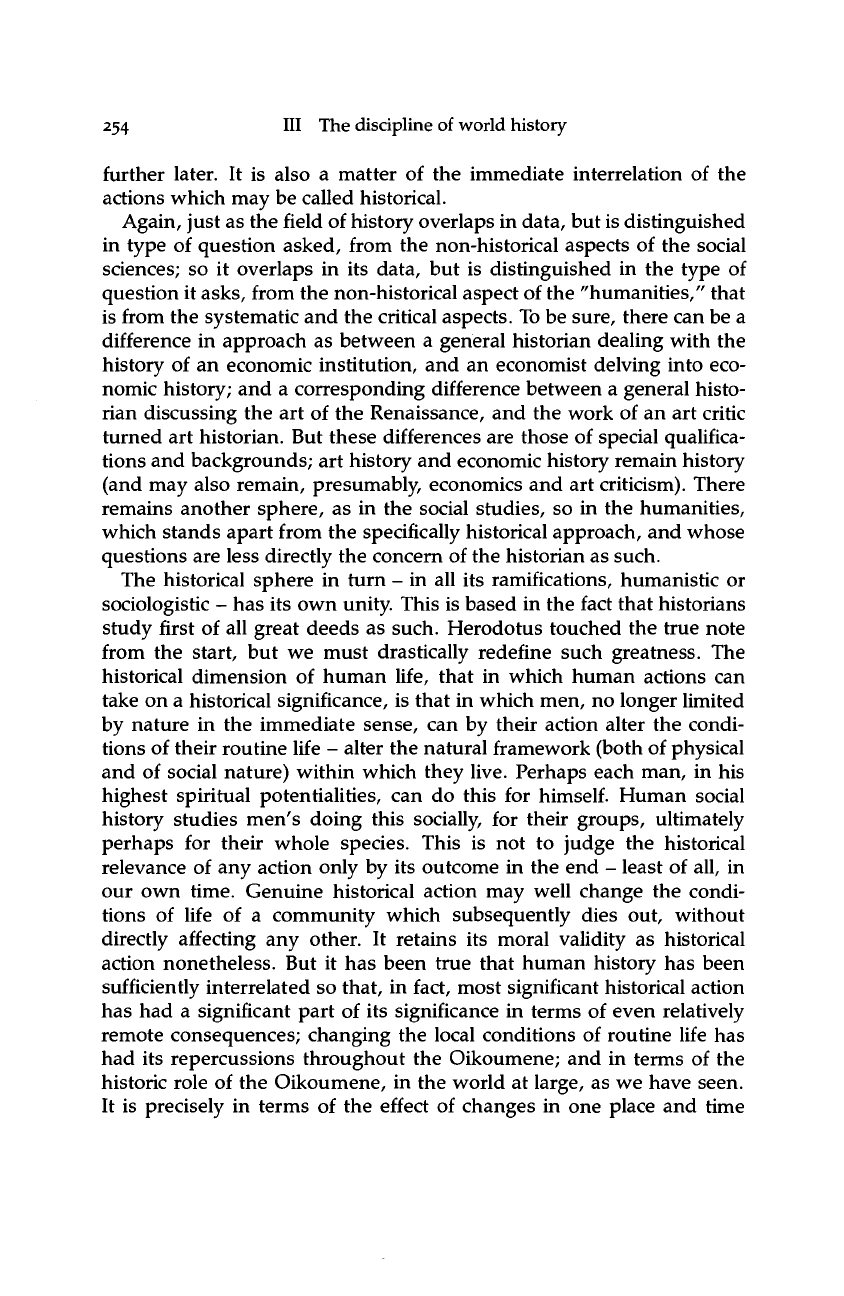
254 III The discipline of world history
further later. It is also a matter of the immediate interrelation of the
actions which may be called historical.
Again, just as the field of history overlaps in data, but is distinguished
in type of question asked, from the non-historical aspects of the social
sciences; so it overlaps in its data, but is distinguished in the type of
question it asks, from the non-historical aspect of the "humanities," that
is from the systematic and the critical aspects. To be sure, there can be a
difference in approach as between a general historian dealing with the
history of an economic institution, and an economist delving into eco-
nomic history; and a corresponding difference between a general histo-
rian discussing the art of the Renaissance, and the work of an art critic
turned art historian. But these differences are those of special qualifica-
tions and backgrounds; art history and economic history remain history
(and may also remain, presumably, economics and art criticism). There
remains another sphere, as in the social studies, so in the humanities,
which stands apart from the specifically historical approach, and whose
questions are less directly the concern of the historian as such.
The historical sphere in turn - in all its ramifications, humanistic or
sociologistic - has its own unity. This is based in the fact that historians
study first of all great deeds as such. Herodotus touched the true note
from the start, but we must drastically redefine such greatness. The
historical dimension of human life, that in which human actions can
take on a historical significance, is that in which men, no longer limited
by nature in the immediate sense, can by their action alter the condi-
tions of their routine life - alter the natural framework (both of physical
and of social nature) within which they live. Perhaps each man, in his
highest spiritual potentialities, can do this for
himself.
Human social
history studies men's doing this socially, for their groups, ultimately
perhaps for their whole species. This is not to judge the historical
relevance of any action only by its outcome in the end - least of all, in
our own time. Genuine historical action may well change the condi-
tions of life of a community which subsequently dies out, without
directly affecting any other. It retains its moral validity as historical
action nonetheless. But it has been true that human history has been
sufficiently interrelated so that, in fact, most significant historical action
has had a significant part of its significance in terms of even relatively
remote consequences; changing the local conditions of routine life has
had its repercussions throughout the Oikoumene; and in terms of the
historic role of the Oikoumene, in the world at large, as we have seen.
It is precisely in terms of the effect of changes in one place and time
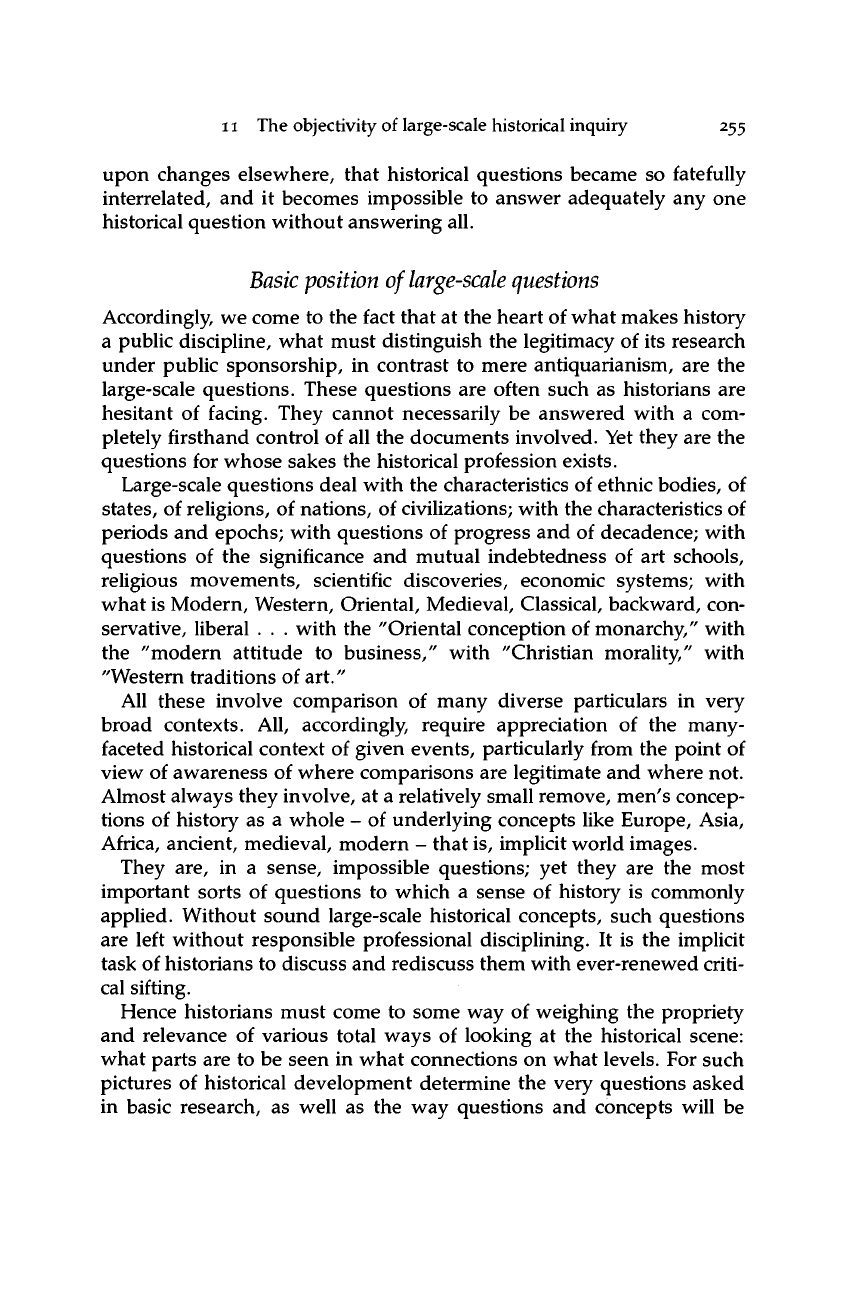
ii The objectivity of large-scale historical inquiry 255
upon changes elsewhere, that historical questions became so fatefully
interrelated, and it becomes impossible to answer adequately any one
historical question without answering all.
Basic position
of
large-scale questions
Accordingly, we come to the fact that at the heart of what makes history
a public discipline, what must distinguish the legitimacy of its research
under public sponsorship, in contrast to mere antiquarianism, are the
large-scale questions. These questions are often such as historians are
hesitant of facing. They cannot necessarily be answered with a com-
pletely firsthand control of all the documents involved. Yet they are the
questions for whose sakes the historical profession exists.
Large-scale questions deal with the characteristics of ethnic bodies, of
states,
of religions, of nations, of civilizations; with the characteristics of
periods and epochs; with questions of progress and of decadence; with
questions of the significance and mutual indebtedness of art schools,
religious movements, scientific discoveries, economic systems; with
what is Modern, Western, Oriental, Medieval, Classical, backward, con-
servative, liberal . . . with the "Oriental conception of monarchy," with
the "modern attitude to business," with "Christian morality," with
"Western traditions of art."
All these involve comparison of many diverse particulars in very
broad contexts. All, accordingly, require appreciation of the many-
faceted historical context of given events, particularly from the point of
view of awareness of where comparisons are legitimate and where not.
Almost always they involve, at a relatively small remove, men's concep-
tions of history as a whole - of underlying concepts like Europe, Asia,
Africa, ancient, medieval, modern - that is, implicit world images.
They are, in a sense, impossible questions; yet they are the most
important sorts of questions to which a sense of history is commonly
applied. Without sound large-scale historical concepts, such questions
are left without responsible professional disciplining. It is the implicit
task of historians to discuss and rediscuss them with ever-renewed criti-
cal sifting.
Hence historians must come to some way of weighing the propriety
and relevance of various total ways of looking at the historical scene:
what parts are to be seen in what connections on what levels. For such
pictures of historical development determine the very questions asked
in basic research, as well as the way questions and concepts will be
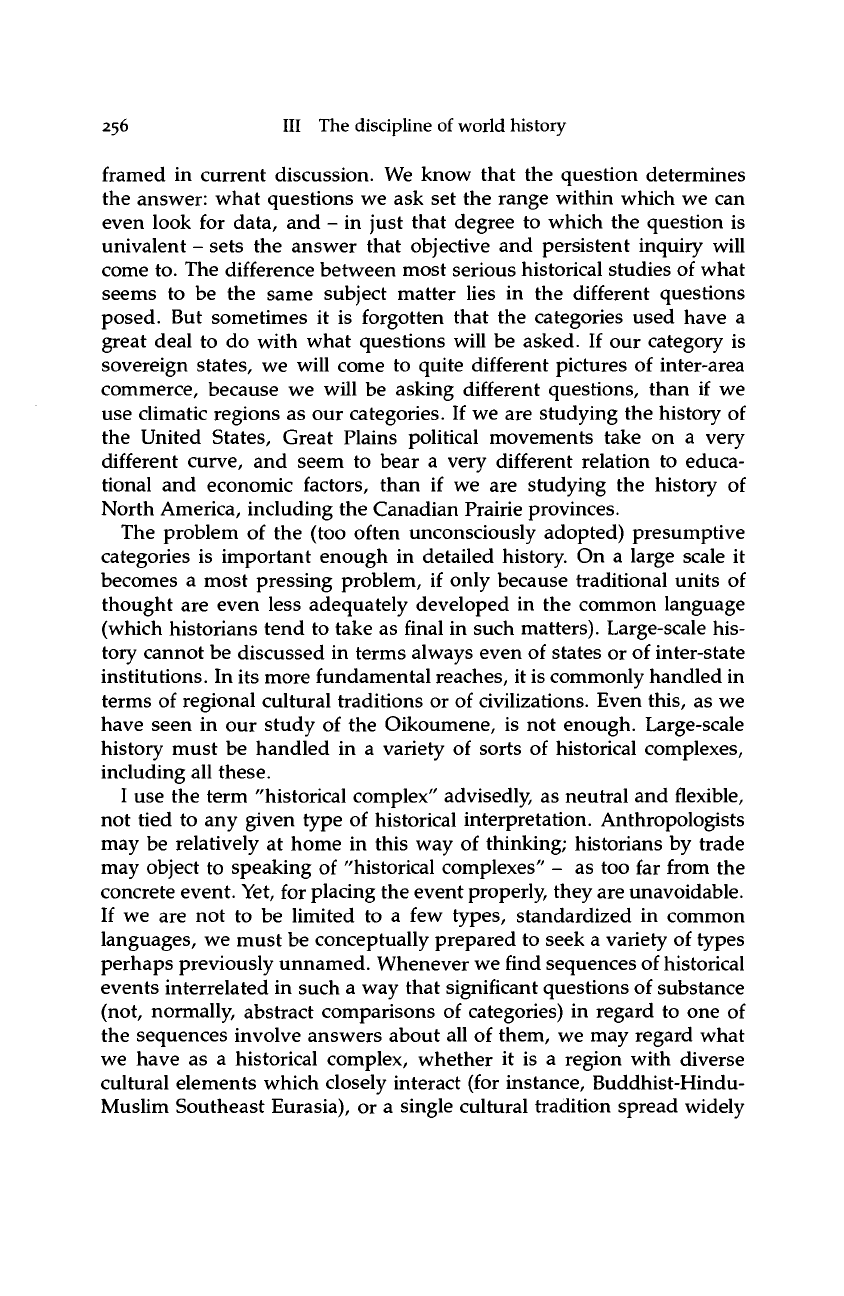
256 III The discipline of world history
framed in current discussion. We know that the question determines
the answer: what questions we ask set the range within which we can
even look for data, and - in just that degree to which the question is
univalent - sets the answer that objective and persistent inquiry will
come to. The difference between most serious historical studies of what
seems to be the same subject matter lies in the different questions
posed. But sometimes it is forgotten that the categories used have a
great deal to do with what questions will be asked. If our category is
sovereign states, we will come to quite different pictures of inter-area
commerce, because we will be asking different questions, than if we
use climatic regions as our categories. If we are studying the history of
the United States, Great Plains political movements take on a very
different curve, and seem to bear a very different relation to educa-
tional and economic factors, than if we are studying the history of
North America, including the Canadian Prairie provinces.
The problem of the (too often unconsciously adopted) presumptive
categories is important enough in detailed history. On a large scale it
becomes a most pressing problem, if only because traditional units of
thought are even less adequately developed in the common language
(which historians tend to take as final in such matters). Large-scale his-
tory cannot be discussed in terms always even of states or of inter-state
institutions. In its more fundamental reaches, it is commonly handled in
terms of regional cultural traditions or of civilizations. Even this, as we
have seen in our study of the Oikoumene, is not enough. Large-scale
history must be handled in a variety of sorts of historical complexes,
including all these.
I use the term "historical complex" advisedly, as neutral and flexible,
not tied to any given type of historical interpretation. Anthropologists
may be relatively at home in this way of thinking; historians by trade
may object to speaking of "historical complexes" - as too far from the
concrete event. Yet, for placing the event properly, they are unavoidable.
If we are not to be limited to a few types, standardized in common
languages, we must be conceptually prepared to seek a variety of types
perhaps previously unnamed. Whenever we find sequences of historical
events interrelated in such a way that significant questions of substance
(not, normally, abstract comparisons of categories) in regard to one of
the sequences involve answers about all of them, we may regard what
we have as a historical complex, whether it is a region with diverse
cultural elements which closely interact (for instance, Buddhist-Hindu-
Muslim Southeast Eurasia), or a single cultural tradition spread widely
